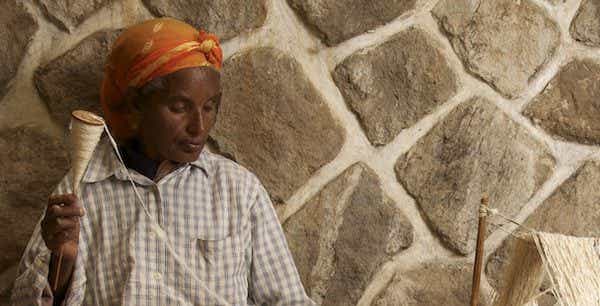Catherine Shimony and Joan Shifrin launched the non-profit, Global Goods Partners, in 2005. It’s an ethical marketplace for gifts that give back to women around the world. Each purchase gives back 100% to women artisans in some of the world’s poorest communities. By providing sustainable and dignified income, they can send their children to school, provide for their households, and strengthen their communities. Read below to learn more about their story...
Katie Couric: Tell us the story behind Global Goods Partners. How did you come up with the idea?
Catherine Shimony: During more than two decades of working in the field of international economic development, Joan and I saw the impact that came from a woman earning an income for the first time. We witnessed the new sense of agency a woman felt in her family when she was able to pay her son and daughters’ school fees and the strength she felt when speaking up in her community.
We launched Global Goods Partners, a not-for-profit social enterprise in 2005 to connect women to the global marketplace and provide training to help women-led groups in resource-poor communities create sustainable and reliable sources of income for women. We focused on artisan crafts because in many communities there are fewer barriers to entry than many other forms of paid work. When women are able to earn an income and control how that money is spent, it can be a complete game changer in their families and their communities.
Today, we work with over 60 artisan communities throughout Asia, Africa and the Americas.
Why is women’s economic empowerment so central to realizing gender equality?
Globally, women and children suffer disproportionately from economic, environmental, political, and social hardships. When women receive the tools to learn a craft, manage their finances, or start and run a business, they gain experience, confidence, practical skills, and economic independence. These skills and experiences enable women to move beyond achieving simple economic improvements to making a real positive impact on the well being of their families and their communities. Becoming a wage earner with decision-making power also has the effect of empowering women to claim their rights, demand access and visibility and fight for equality within their families and their communities.
How do you find the artisan groups that you work with? Tell us a little bit about this process…
When GGP first launched, we identified our initial artisan partners through our previous work experiences in international development. Through our travels, professional networks, speaking engagements and the advent of nearly universal internet access, we have met artisans whose work we love and admire.
As a not-for-profit organization, our impact is greatest when we devote our expertise and resources to supporting and promoting artisan organizations that are relatively young and seeking to expand beyond their local market.
GGP's priority is to find strong women-led community groups with quality handmade products that have the potential to be marketed successfully in international markets. Our artisan partners are community-based organizations, social enterprises, and artisan cooperatives that produce handcrafted items as well as offer community development programs to improve the economic well being and quality of life in their communities.
Before we partner with an artisan group, we share information and ensure that their mission is aligned with ours. All of our artisan partners abide by the principles of fair trade, have strong governance structures and are transparent entities.
Can you share with us a story or two about women who have benefited and seen their lives change for the better from working with Global Goods Partners?
Micaela is one of the extraordinary craftswomen we work with every day.
Micaela is a member of Mayan Hands, a cooperative in Santiago Atitlán, Guatemala, located on the shores of beautiful Lake Atitlán.
We first met Micaela, as she demonstrated her weaving skills and stepped aside to teach our design director, Jenn Wong, the ropes.
Micaela's story is a special one...
As part of an indigenous community, she faces the double discrimination of being Mayan and a woman in Guatemala. Defying these very real barriers, Micaela decided that at the age of 33, she would start school.
"I always wanted to go to school, but I couldn’t when I was a girl. Later, when I was an adult, I sometimes thought about it, but I had no idea how to do it. I was afraid to even register because I didn’t know how to read or write, not at all."
It wasn't until one day that she was creating an invoice that she thought to herself, "this has to stop, now. I need to learn to read and write." She applied for one of the scholarships offered through the cooperative and was accepted to school for the first time.
In October 2016, Micaela graduated from elementary school. She completed six grades in three years.
What are your hopes for the future for Global Goods Partners?
Our vision is all about equity: a fair and just world where human rights for all are respected and where women and all marginalized communities are granted full equality. There’s work to do on so many fronts—environmental, educational, health, political, legal. We’re going at it from an economic angle because that’s where we know how to make a difference. Our hope is that GGP will continue to help build and fortify women-led artisan enterprises that will in turn ignite economic growth in communities around the world.
Katie: Thanks so much for sharing your story with us, Catherine!









